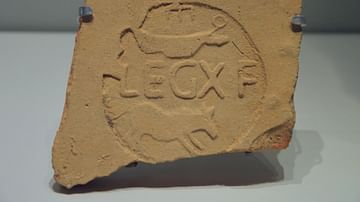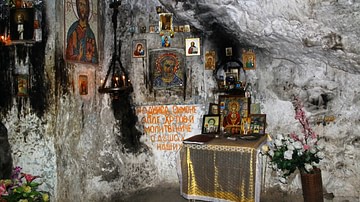Search
Did you mean: Tacitus?
Search Results

Video
Relief from the Arch of Titus, showing The Spoils of Jerusalem being brought into Rome
Relief panel showing The Spoils of Jerusalem being brought into Rome, Arch of Titus, Rome, after 81 C.E., marble, 7 feet,10 inches high
Speakers: Dr. Steven Fine and Dr. Beth Harris

Definition
Domitian
Domitian was Roman Emperor from 81 to 96 CE and his reign, although one of relative peace and stability, became engulfed in both fear and paranoia. His death at the hands of those who were closest to him brought an end to the short dynasty...

Definition
Roman Forum
The Roman Forum or Forum Romanum of ancient Rome was the bustling religious, administrative, legal, and commercial heart of the city from the 7th century BCE onwards. Made increasingly grandiose and ceremonial in function by the Imperial...

Definition
Vespasian
Vespasian was Roman emperor from 69 to 79 CE. Vespasian was the last of the four emperors who governed the Roman Empire in the year 69 CE. The previous three had died either by murder or suicide. Unlike Galba, Otho and Vitellius, Vespasian...

Definition
Legio X Fretensis
Legio X Fretensis was a legion of the Roman army formed by either Julius Caesar or Augustus. The legion spent most of its existence in the East, primarily in Judea. It participated in Corbulo’s two Armenian campaigns as well as Vespasian...

Definition
Colosseum - Rome's Great Flavian Amphitheatre
The Colosseum or Flavian Amphitheatre is a large ellipsoid arena built in the first century CE by the Flavian Roman emperors of Vespasian (69-79 CE), Titus (79-81 CE) and Domitian (81-96 CE). The massive arena held 50,000 spectators and hosted...

Definition
Flavius Josephus
Titus Flavius Josephus (36-100 CE), was born Yosef ben Matityahu and became a 1st-century CE Jewish historian. He was a member of a priestly household in Jerusalem through his father’s side (the house and order of Jehoiarib), and his mother...

Definition
Zealots
The Zealots were a group of Jews who began to emerge as a religious/political movement around the beginning of the 1st century CE. They strongly opposed Roman rule and turned on everyone, including other Jews, who cooperated with Rome. A...

Video
The Flavian Dynasty of the Roman Empire
The Flavian Emperors were a dynasty of Roman emperors who ruled from 69 to 96 CE. They consisted of three emperors: Vespasian, Titus, and Domitian. - Vespasian (ruled 69-79 CE) was a skilled military commander who rose to power during the...

Article
The Great Jewish Revolt of 66 CE
The Roman Empire in the early 1st century CE was often regarded as the perfect empire. The outstanding military prowess of the Romans was used to expand the empire, and once the territories were acceptably pacified, Roman political power...